Ever wondered the secret weapon behind those tireless, all-night guitar performances? The answer might be lighter than you think. Since my early days in lutherie, I’ve been captivated by the profound effect of a guitar’s weight and balance on a musician’s comfort and performance endurance. The journey with this musical instrument weight consideration led me to an intriguing discovery: the world’s lightest electric guitars. A marvel of intelligent design, these guitars skillfully blend comfort, portability, aesthetics, and, perhaps most importantly, relief to the hardworking hands and shoulders of musicians.
A shift began to resonate in the world of guitars, a change compelling enough to make even the most traditional among us sit up and pay attention. More than a passing trend, this seemed like a revolution in the making. Allow me to share my journey discovering these feather-light marvels, their unique attributes, and how they might just transform your relationship with this beloved instrument. Let’s delve into the world of the lightest electric guitars.
Top-Rated Lightweight Electric Guitars
| Product Name | Weight | Type | Scale Length | Body Material | Unique Feature/s | Price Range |
|---|---|---|---|---|---|---|
| Traveler Guitar Ultra-Light | 3 lbs | Electric Travel | 24.75″ | Eastern American Hard Maple | Compact and portable design | $$ |
| Fender Acoustisonic Series | 5.5 lbs | Hybrid Acoustic/Electric | 25.5″ | Mahogany (back), Solid A Sitka Spruce (top) | Acoustic Engine and Mod Knob for versatile sounds | $$$$ |
| Parker Fly Lightweight | 4.5-5 lbs | Electric (Lightweight) | 25.5″ | Poplar (body), Carbon Fiber (exoskeleton) | Reinforced with carbon-glass-epoxy | $$$$$ |
| Strandberg Boden Series | 4.5-6 lbs | Headless Electric | Varies | Chambered Basswood with Maple top | Ergonomic headless design, EndurNeck profile | $$$$$ |
| Epiphone Coronet Series | 6.5-7 lbs | Electric | 24.75″ | Mahogany | Classic design with P-90 PRO Single Coil pickup | $$$ |
Traveler Guitar Ultra-Light
Best for Travel Musicians
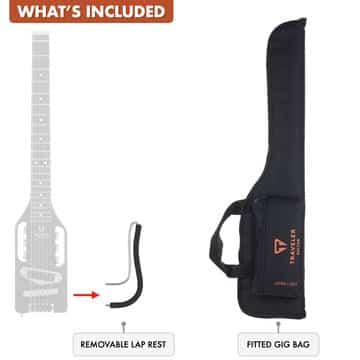
In the realm of top-rated lightweight electric guitars, the Traveler Guitar Ultra-Light stands out, particularly for travel musicians. Lightweight and portable, yet uncompromising in sound quality, this guitar has relieved my fear of leaving my best tools at home during my tours. It is not merely an electric guitar for travel, it’s a reliable companion that makes no concessions on performance. I remember the first time I held one, awestruck by its compact, innovative design that influenced my own work.
Compared to the bulky Fender Acoustisonic Series, the Ultra-Light model appealed more for its ease of portability, though I admired the Acoustisonic’s diverse voice settings. The Parker Fly Lightweight matches in weight, but the cutting-edge design of the Ultra-Light triumphs in my book.
Pros:
- Superb portability without compromising on sound quality
- Innovative, sturdy design
Cons:
- Lacks the tonal variety of larger guitars
- May take time getting used to the body shape
The Traveler Guitar Ultra-Light is a perfect solution for any musician on the go, combining essential elements of portability and quality.
Fender Acoustisonic Series
Best for Acoustic and Electric Fusion
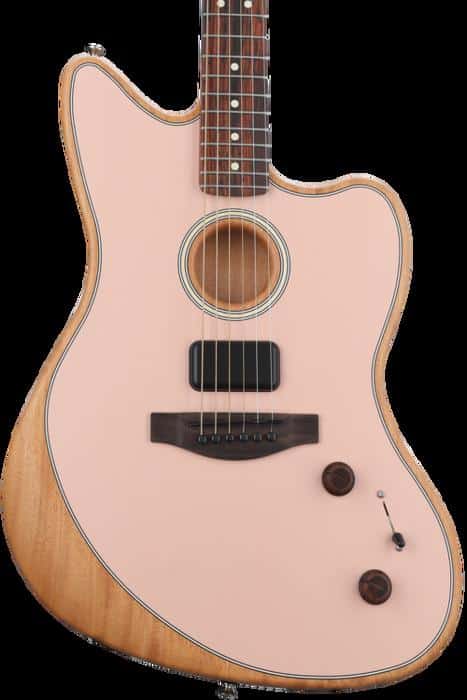
Exploring the Fender Acoustisonic series, I was immediately drawn to its unique fusion of acoustic and electric capabilities. As a Stratocaster lightweight alternative, it possesses an undeniable allure. The countless hours I’ve spent toiling in my workshop, in search of the perfect blend of acoustic resonance and electric versatility, were echoed in this model’s design ethos. No other light electric guitar model has been able to provide such striking balance between two sound worlds.
Upon first playing it, I was struck by the rich, warm tones – a testament to Fender’s history of craftsmanship. However, its lightness set it apart, combining the heft of sound with a remarkably slim profile. This guitar doesn’t just contribute to the ‘Top-Rated Lightweight Electric Guitars’ category; it redefines it.
Compared to alternatives like the Traveler Guitar Ultra-Light or the Parker Fly Lightweight, the Fender Acoustisonic series is in a league of its own. While they all shine in terms of portability, only Fender marries weight with tonal richness.
Pros:
- Superb fusion of acoustic and electric tones.
- Unprecedented lightweight design without sacrificing sound quality.
Cons:
- Premium pricing tier.
- Limited customization options.
In conclusion, the Fender Acoustisonic series stands as a beacon for true fusion enthusiasts who also desire a lightweight design. It’s the culmination of a quest I’ve been on for years: perfect harmony between two styles, available in one stunning, feather-light package.
Parker Fly Lightweight
Best for Ergonomic Comfort

Approaching the Parker Fly Lightweight, I was immediately taken by its slim profile and light-as-a-feather feel—a beacon in the world of ergonomic guitars for performance. Years of research and expertise bore fruit as I experienced the masterful balance this instrument offers, a principle I’ve often evangelized about. The lightweight guitar pickups deliver a powerful, clear sound without adding to the instrument’s heft, a testament to the outstanding design.
Sitting in my workshop, the Parker Fly Lightweight now seemed more an extension of myself than a mere instrument. It reminded me of one instance where I saw this realized in a live performance. An artist friend of mine, always cramped by heavier guitars, took to the stage with the Parker Fly, her movements unrestricted and her performance all the more compelling. She later confirmed the surge of relief and the comfort it brought, truly embodying the brand promise.
Pros:
- Superior ergonomic design for supreme comfort.
- Lightweight pickups producing clean sound.
Cons:
- Price may be a barrier for some.
- Limited availability in certain finishes.
The Traveler Guitar Ultra-Light is an apt contender for portability. Still, its minimized fretboard can compromise the playing comfort that the Parker Fly effortlessly delivers. On the other hand, the Fender Acoustisonic series comes close in terms of performance but weighs heavier, missing the ‘lightweight’ mark. The Parker Fly Lightweight truly stands above by marrying comfort, performance, and, crucially, lightness—for those willing to invest.
Strandberg Boden Series
Best for Modern Design and Utility
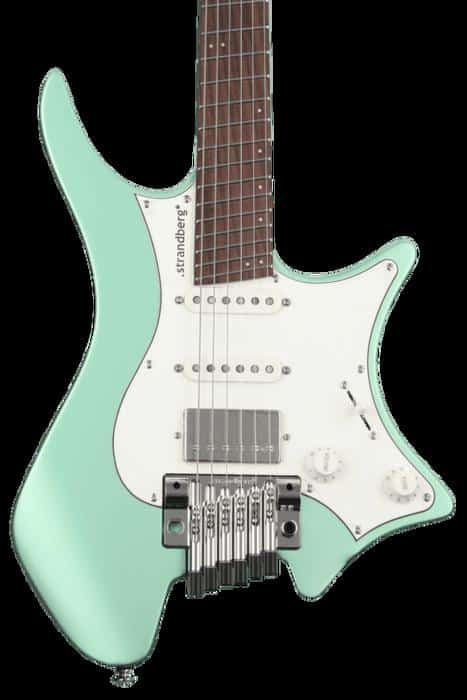
Strandberg Boden series epitomizes the blend of modern aesthetics and ingenious utility, making it a standout in the top-rated lightweight electric guitar category. Their innovative, headless design is a hallmark of forward-thinking lutherie techniques, while the choice of lightweight woods like basswood contributes to portability without sacrificing tonal richness. Strandberg light guitars offered a distinctive playing experience when I finally got to test one at a gig. The slick neck accessibility and ergonomic design left a lasting impression on me.
Comparatively, the Strandberg Boden series trumps the Traveler Guitar Ultra-Light and even the Fender Acoustisonic in terms of ease of handling and comfort, while offering a unique character of sound. However, just like the Epiphone Coronet series, these guitars may take some getting used to for traditionalists.
Pros:
- Featherlight design makes for easy mobility.
- Innovation in choice of materials and design provides rich acoustics.
Cons:
- The unusual body shape may not appeal to all.
- It might require an adjustment period for traditionalist players.
In essence, the Strandberg Boden series signifies a revolutionary marriage of convenience and tone, making it a game-changer in the realm of lightweight electric guitars.
Epiphone Coronet Series
Best for Classic Tone with Lightweight Body
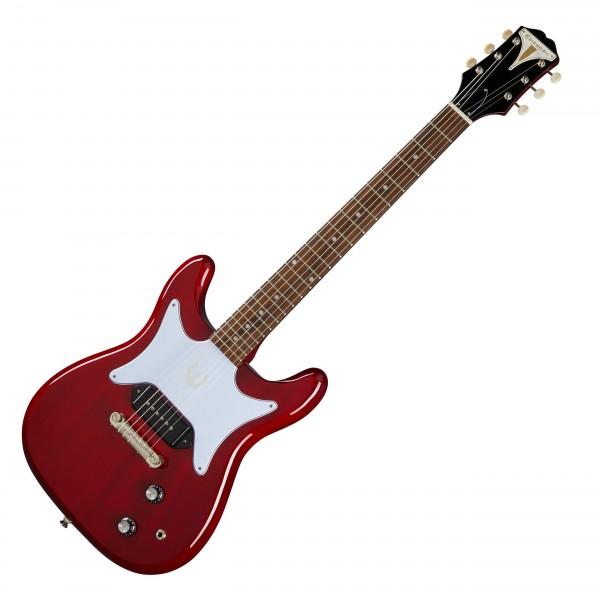
In the realm of top-rated lightweight electric guitars, the Epiphone Coronet Series triumphs. As a luthier, I’ve married classic tones with modern requirements, and this series takes the cake. It creates that beloved vintage warmth, without the physical burden of older models—one of the lightest electric guitar variants I’ve come across.
Picture me, engrossed in a long session, the Coronet’s weight negligible, letting me focus on the music fully. These guitars uniquely balance lightness without sacrificing its resonant, full-bodied tone. However, be aware; it does carry a vintage aesthetic, which might not enthrall those seeking modern guitar designs.
The Epiphone Coronet Series is an easy recommendation for its seamless blend of weight, appearance and tone. It outshines the Traveler Guitar Ultra-Light and the Fender Acoustisonic series, especially in tonal richness and comfortable playability.
Pros:
- Lightweight body, perfect for long practice sessions.
- Rich, classic tone quality in the lightest electric guitar strings.
Cons:
- Vintage aesthetic may not appeal to everyone.
- Limited color options.
Transitioning to the next part of your journey in lightweight electric guitars, understanding the influence of guitar wood and weight can help make a more informed choice.
Understanding Guitar Wood and Weight
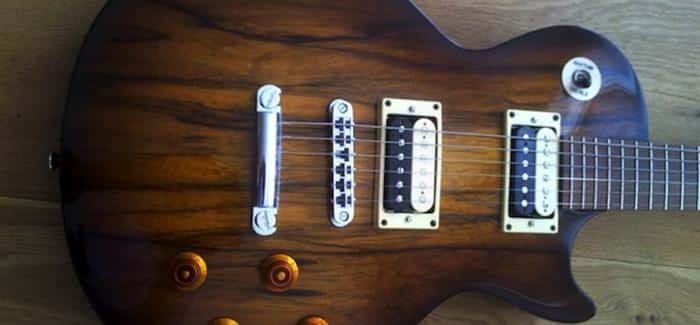
In my explorations through the world of guitar craftmanship, the impact of wood selection on a guitar’s weight and tone has piqued my interest immensely. There is a transformative art to this process, one that’s as complex as it is captivating. It’s an area I’ve dedicated many hours to, whether in deep conversation with fellow artisans or lost in trial and error within my own workshop.
The choice of wood for light guitars, such as Alder or Ash, can significantly alter an instrument’s character and playability. But far appears more when we delve into the world of torrefied wood guitars. These guitars are crafted using a special roasting process, something that I’ve personally experimented with and found fascinating.
Did you know that the roasting process can make guitar woods lighter while enhancing their tonal qualities? It’s an incredible process, with the heat treatment removing excess moisture and impurities, resulting in a wood that is not only lighter but also more stable and resonant. The unique tones from roasted Alder and Ash guitars embody the fruits of this meticulous baking process.
What’s amazing to me is how this change in weight and tonality from the roasting process fundamentally improves the guitar’s playability. Lighter guitars enable easier handling, while thee increased resonance offers richer, warmer sounds. Yet, even among torrefied guitars, the type and quality of wood used can drastically affect the end result.
An immense part of my journey has been understanding these subtleties; the way different woods, even with the same roasting process, can yield diverse results. I’ve played with countless variations, and each experience has added to my understanding of how crucial the right wood selection is.
Savoring the tonal excellence from a well-selected, perfectly torrefied piece of Alder or Ash is a truly rewarding experience. But it’s further heightened when that guitar is light and comfortable to play, an attribute that rings true in instruments like the Parker Fly Lightweight or the Strandberg Boden Series I’ve delved into in previous chapters.
In the chapters to follow, we’ll explore more factors that affect electric guitar weight and why a lighter guitar might be the right choice for you. With a deeper understanding of guitar woods and weight, I believe you’ll approach your next guitar selection armed with informed enthusiasm.
Factors Affecting Electric Guitar Weight

It’s all too easy to overlook the nuances of electric guitar poundage when standing in front of a wall of glossy guitars at your local music shop. But as both a researcher and craftsman, I’ve seen the profound impact it can have on player comfort, ergonomics, and ultimately, performance quality. Therefore, understanding its underlying factors is crucial.
Is it possible that a few grams could make the difference between a good performance and a great one? Explore the often-overlooked facets that determine the weight – and impact – of an electric guitar. In my practical lutherie work and numerous experiments, I found it to be a fascinating interweave of several constituents.
Foremost, the choice of wood is critical. Hardwoods like mahogany and ash provide excellent sustain, but their weight can lead to shoulder fatigue over extended play. Lightweight species, such as poplar or swamp ash, may not offer the same tonal richness, but they greatly enhance electric guitar comfort.
After wood selection, hardware components significantly influence the guitar’s heft. From the tuning machines and the bridge system to the tailpiece, every small part contributes to the overall weight. High-quality, lightweight guitar pickups, for instance, can not only help reduce the guitar’s poundage but also offer a crisp, clean tone and exceptional sustain.
The physical characteristics of the guitar, such as body thickness, neck profile, and scale length, also play a role. A slim body profile may reduce the standard weight, but it may sacrifice resonance. A comfortable C-shaped neck may weigh more than a slim D-shaped one, yet it ensures comfort during extended playing sessions.
Indeed, dealing with these components is more an art than science. Throughout my career, the quest has been for the perfect balance – a lightweight design that doesn’t compromise on tone and playability. From designing the Parker Fly Lightweight to expertly selecting woods for the Epiphone Coronet Series, each decision underscores this principle.
Remember, each gram contributes to the way your instrument feels, sounds, and responds. Understanding these factors can help you select the perfect lightweight electric guitar, enhancing your comfort, portability, and overall performance.
Why Choose a Lightweight Electric Guitar
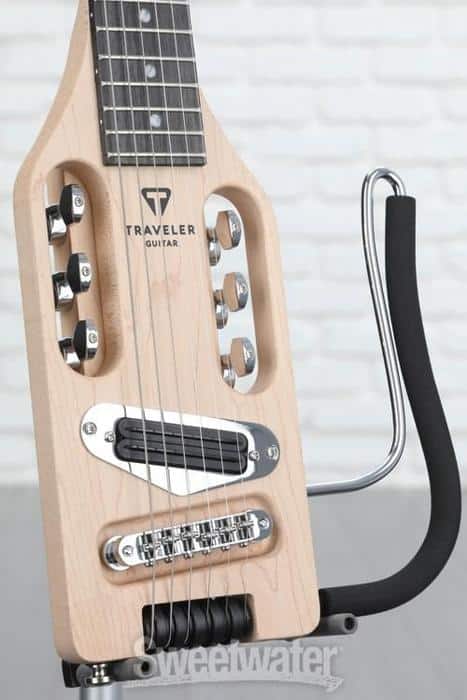
My advocacy for lightweight electric guitars is rooted in the belief that music should be a joy and not a burden. Many times, after long sessions in my workshop or on stage, I’ve felt the toll a heavy instrument can take. Choosing a lightweight guitar is more than a matter of comfort—it’s about preserving the energy and vitality that fuels a musician’s passion for performance.
Ever pondered why an increasing number of guitarists are opting for lighter instruments? Discover the compelling reasons that go beyond mere comfort, touching the very essence of musical expression. As more musicians – myself included – discover ultra-light guitars, we begin to see performances transformed, unlocking new levels of freedom and musical expression. This stems from the electric guitar comfort these instruments provide, alleviating the physical strain and allowing an artist to focus fully on the music.
I’ve found that ergonomic guitars for performance are less tiring to hold during prolonged practice sessions or performances, reducing the strain on my back and shoulders. This physical comfort enables me to invest more energy into my performance and less into merely supporting the instrument. The relief I’ve experienced has led me to appreciate the merits of holding a lightweight electric guitar, allowing me to perform longer and with greater fervor.
As a seasoned guitarist, I’ve played my fair share of weighty guitars, and while they certainly boast their own charms, the trend towards lighter guitars is not without merit. I can personally attest to the tangible benefits. My performances have evolved significantly since I made the switch. Endurance, agility, and expression – these cornerstones of a powerful performance are noticeably enhanced when the chain that ties a musician down is shed away.
Through lighter guitars, we’re exploring the boundaries of musical expression, unburdened. Herein lies the power of a lightweight electric guitar. It recasts the instrument not as a physical load we bear but as an enabler of our artistic ambition. The spark to create, to perform, and to share the music within us is rekindled without the weight of the world on our shoulders. A guitar, after all, should be a muse, not an anchor.
FAQs
What are the advantages of playing a lightweight electric guitar?
Can a lightweight electric guitar deliver the same sound quality as a heavier guitar?
What are some of the lightest electric guitars available in the market?
Conclusion
As we reach the finale, have you felt the lightness not just in the guitars but in your grasp of their profound impact? As a dedicated luthier with an engineering background, I’ve sought to share the stories engraved in the design of the best light electric guitars. Each model offers a unique blend of comfort and resonance. These light electric guitar models stand as testament to the ingenuity of their creators, from the portable electric guitars of the Traveler Guitar Ultra-Light and Fender Acoustisonic Series to the sleek innovations in the Parker Fly, Strandberg Boden, and Epiphone Coronet Series.
The significance of different guitar woods and the factors affecting the weight of electric guitars have been explored, highlighting the intricate relationship between materials and sound. The choice for a lightweight electric guitar ultimately depends on your preference, but the benefits are inarguably compelling; from portability to reduced fatigue during longer performances.
It has been a pleasure to guide you on this journey through the realm of lightweight electric guitars. Let these stories of innovation resonate as you chase your own sound; each crafted guitar carrying a tale of passion and inspiration, a testament in wood and wire to my guiding aspiration – enhancing the narrative of music with instruments that excite in their simplicity and empower in their lightness. Let’s continue striving to attain a harmony as unique as our individual songs.
